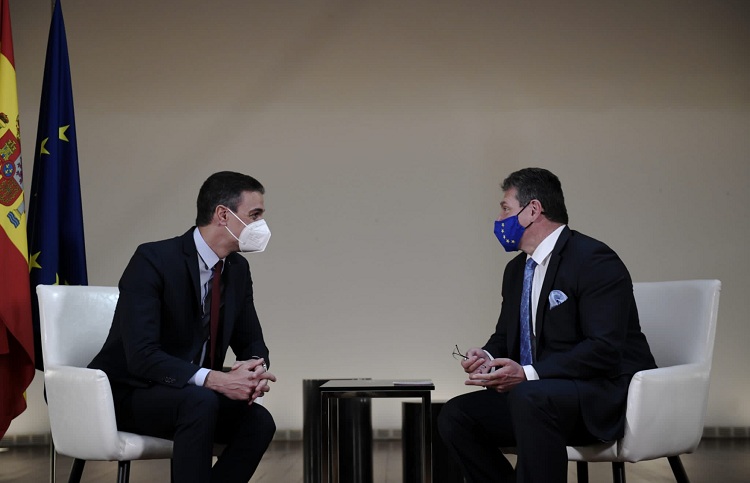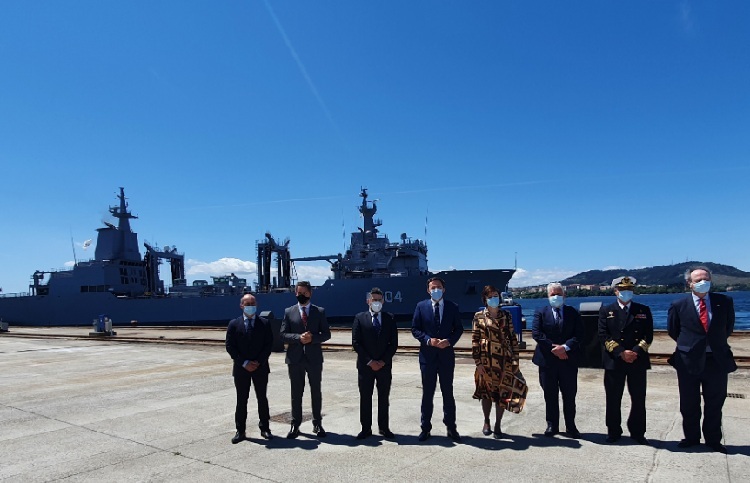The Diplomat
The Vice President of the European Commission for Institutional Relations and Foresight, Slovak Maroš Šefčovič, yesterday expressed his support for the España 2050 plan, a “collective exercise of strategic foresight” presented by the President of the Government, Pedro Sánchez, to design “what country we want to be in 30 years”.
Šefčovič participated yesterday, at the Museo Nacional Centro de Arte Reina Sofía in Madrid, in the presentation of the study España 2050: Fundamentos y propuestas para una Estrategia Nacional de Largo Plazo (Foundations and proposals for a Long-Term National Strategy), a study prepared by a hundred researchers from various academic disciplines under the coordination of the National Office of Foresight and Strategy and with the support of agencies such as AIReF, the Bank of Spain and the Joint Research Centre of the European Commission.
As Pedro Sánchez explained during the event, the study provides “a rigorous and holistic diagnosis of the challenges that Spain is going to face, not only today, but also in the medium and long term, analyzing the possible risks and also the opportunities that could be generated by mega trends, such as climate change, demographic aging or digital transformation”.
To this end, the study proposes 50 objectives that Spain should achieve between now and 2050 if it wants to consolidate itself as “one of the most advanced countries in Europe”, which are grouped around nine major country challenges: To be more productive in order to grow better; to conquer the educational vanguard; to improve the training and re-skilling of the population; to achieve a carbon neutral, sustainable and resilient society to climate change; to prepare the welfare state for a longer-lived society; to promote a balanced, fair and sustainable territorial development; to solve the deficiencies of the labor market and adapt it to the new social, economic and technological realities; to reduce poverty and inequality, and reactivate the social elevator; and to broaden the bases of future welfare.
During his speech, the Vice President of the European Commission linked the España 2050 plan to the EU’s strategic objectives for the next decade, and specifically to the digital and ecological transformations, as well as to the need to correct the gap in the global supply chains that feed the EU. “Of course, the Commission cannot do all this alone”, he warned. “To succeed, Europe needs the commitment of all Member States” and, “in this process, Spain is an example to follow”, he added. “España 2050 is an important contribution to our joint strategic effort, and I am convinced that it will serve as a model for other member states to follow suit”, he said.
“The nine challenges or areas identified as priorities” by the España 2050 plan “are certainly relevant for the future of Spain, but they are also of key importance for our entire Union”, said Maroš Šefčovič. For example, he explained, “the España 2050 strategy aims to foster our collective resilience to emerge stronger”, and that is “also what we plan to do with the 2021 Commission’s Strategic Foresight report”, which “will focus on the EU’s strategic autonomy to reduce our vulnerabilities”, he added.
Apart from that, Spain 2050 aims to achieve “competitive sustainability and a strong welfare state, putting Spain on a par with the most advanced economies”, an objective that “is in line with our ongoing work on how we can make the EU more resilient, from a holistic perspective, i.e. social, economic, ecological, digital and geopolitical”, Šefčovič assured.
The European Vice President arrived in Madrid this past Wednesday to meet with the Minister of Foreign Affairs, Arancha González Laya, with whom he discussed the preparation of the negotiations between the EU and the United Kingdom regarding Gibraltar; and with the Fourth Vice President and Minister for Ecological Transition and the Demographic Challenge, Teresa Ribera.







